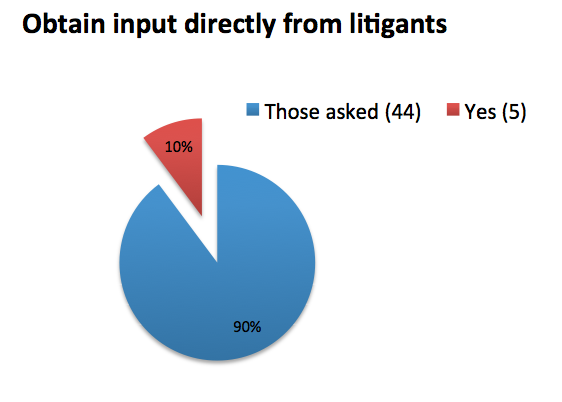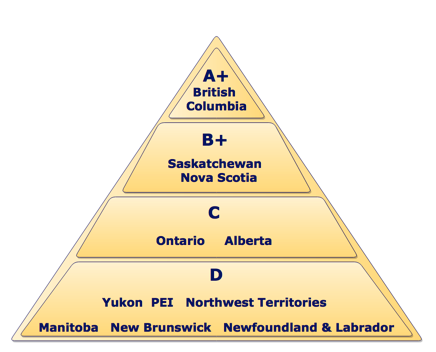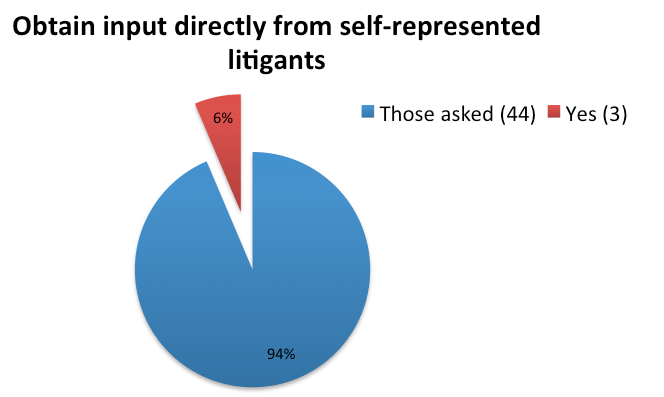Last summer, on behalf of the NSRLP, I sought some feedback on the extent to which Access to Justice initiatives across Canada were engaging actual litigants and/or self-represented litigants in developing their ideas, strategies and programs.
A simple survey was mailed out to 44 respondents – essentially, every provincial and territorial government, the Federal government, each Law Society, each CBA branch and the Canadian Forum on Civil Justice – bodies we assumed would be most engaged in Access to Justice efforts.
The letter I wrote outlining the request for information (which could be by mail or via a simple online Survey Monkey) included the following explanation of our goals:
“… a concern which has been raised by our organization and by SRLs in general is a perception that efforts to address issues relating to Access to Justice have not taken advantage of direct input from those persons who have been “consumers” of our Justice system – being represented and self-represented litigants themselves. Stakeholder groups appear to be represented quite heavily by lawyers, academics, government personnel and other NGO’s – with much lesser input and involvement by actual former litigants themselves.
To address this perception, we are seeking advice and input from the various Access to Justice efforts ongoing throughout Canada in order to determine if this concern is real or simply perceived.”
The survey asked:
- Do you have any former litigants/ former self-represented litigants directly involved as directors or officers of your A2J organization/ body?
- Do you obtain direct input from other litigants to guide your process decisions relating to A2J, and if so, in what manner?
- Do you obtain direct input from former self-represented litigants specifically to guide your process relating to A2Js decisions, and if so, in what manner?
My letter concluded:
“We greatly appreciate the work of all stakeholders in seeking to improve access to justice in Canada, including yourselves, and are seeking to use this information to help guide our own efforts in assuring that we are as effective as possible in carrying out our own mandate.”
Survey Responses
We received responses from just 12 of 44 of those to whom the letter was sent, which trickled in over a period of five months (hence some of the data reported here may be out-of-date by this point, but we wanted to wait to present as complete a picture as possible from the responses received).
We received mailed responses from the British Columbia Ministry of Justice; the Law Society of the Northwest Territories; the Yukon Ministry of Justice; the Northwest Territories Ministry of Justice; the Law Society of Alberta; the Nova Scotia Ministry of Justice; the Ontario Ministry of the Attorney General; the Newfoundland and Labrador Department of Justice and Public Safety; and the Canadian Bar Association.
We received online survey responses from the Saskatchewan Ministry of Justice; the Manitoba Ministry of Justice; and the Prince Edward Island Ministry of Justice
Survey Results
In response to the question, “do you have any former litigants directly involved as directors or officers of your A2J organization and if so, how many?”
- Just 1 of the 12 respondents (British Columbia Justice) reported having former litigants directly involved as directors or officers of an A2J policy group or organizations.
The only standing member of an A2J policy reform group in Canada whom we are aware of who is a former self-represented litigant is Jennifer Muller, NSRLP Advisory Board member, who sits on the Executive of the British Columbia Access to Justice Committee.
In response to the question, “do you obtain direct input from former litigants to guide your process decisions, and if so, in what manner?”
- 5 respondents reported that they obtain input directly from litigants by way of various surveys or other forms of user input (British Columbia Justice, Saskatchewan Justice, Canadian Bar Association, Law Society of British Columbia, Nova Scotia Justice)
 In response to the question, “do you obtain direct input from self-represented litigants specifically to guide your process, and if so, in what manner?”
In response to the question, “do you obtain direct input from self-represented litigants specifically to guide your process, and if so, in what manner?”
- 3 respondents reported that they obtain input specifically from self-represented litigants (Saskatchewan Justice, British Columbia Justice, the Law Society of British Columbia)
Why Not Consult Former Litigants/ Self-Represented Litigants?
There were some common themes in the letters that identified reasons for not including litigants/ self-represented litigants in any consultative role beyond (in just some cases, see above) the collection of survey data.
These were all reasons we have heard before and included:
- We do not include system users in consultations but instead we work with organizations that work with them and they tell us about them
- We do not include system users in F2F consultations because they would not understand the need for “critical confidentialities”, because they are not legally trained
- Obtaining input of any kind from system users is difficult because we have been unable to access a reasonable sample
Does Your Province Have a Failing Grade for Public Participation on A2J Reform? A Grade Report Card
NSRLP can and does offer access to our SRL database for the purposes of matched user testing and feedback. By far the most requests to date have cone from British Columbia (Justice BC, Mediate BC). We have also been asked to find testers to comment on new resources being developed by Community Legal Education Ontario (CLEO). We are delighted to respond to these requests, and are currently reorganizing our large database of SRLs in order to be able to respond more quickly and to target SRLs with specific demographics and experience, as requested.
This experience with requests for testers has been factored into the grades we have assigned below to each province for “public participation in A2J reform.” We do not claim a scientific status for these grades, but believe that they are reasonable estimates based on the responses to the survey, as well as our own experience of working with some provincial organizations to provide SRL input.
A Public Participation Grade Report Card
Our purpose in publishing the Public Participation Grade Report Card is to push the debate over public participation forward. As you can see below, the Report Card highlights the lack of user involvement in system reforms, in all but a few exceptional provinces.
What Do These Results Tell Us?
I understand everyone engaged in A2J initiatives across Canada to be well motivated, but there seems to be a real limit on how far organizations are willing to seek input from those who actually experience the problem.
These somewhat miserable and even failing grades for some provinces are disappointing, but not surprising. Most of the most promising initiatives – for example, the “Social Labs” model being used in British Columbia, Alberta and Ontario – relies heavily upon the anecdotal experience of the “usual suspects” – that is, lawyers, government administration, and academics – to guide system change.
As the saying goes, “when you’re a hammer, every problem looks like a nail” – and collecting a bunch of “hammers” to provide input on what the problem is and how it should be resolved, is almost certainly going to look like, “the problems are nails, and we need to hammer them.”
We are very pleased to see that data is being gathered from litigants on their experiences (for example, Nova Scotia, Saskatchewan and British Columbia), but an important question is how justice ministries are then using that information.
If SRLs and other former litigants are asked for their input and then told to “go sit in the corner while we decide what’s best for you” – well, this contributes to the essential problem all over again. Our collective A2J effort must eschew the traditional paternalism of the legal system to “tell people what they need”, but to, perhaps, shift gears and start asking them.
By: Robert G. Harvie, Q.C., NSRLP Advisory Board Member



I am in British Columbia, I am a former and may again have to be a current, self represented litigant. I have had direct contact with the attorney general of BC, and the RCMP, the courts, and still cannot seem to find a lawyer willing to take my case. It is because I am challenging the entrench belief system that DNA testing is the actual word of god, I have asked to be permitted to review the work produced and not just the report from the lab, I cannot get the court to order it, the lab refuses, the information and privacy commission supports them, the police mock and ridicule me and make some of the most ridiculous comments regarding evidence I have ever read. The ministry of the attorney general hide behind the RCMP. What I am asking for is my legal right to review the entire evidence package, not an unreasonable request? I have been thrown out of court and labeled vexatious. How can the merits of a case be judged without the entire case disclosed? IT CANNOT. I have been hidden from all view now, but not gone, I have since sent my YouTube case to the attorney general of Canada, Justin Trudeau, the newsmedia. etc etc. and will continue to do so. The shameful way I have been denied my rights to examine evidence, is how British Columbia, and its justice system deals with the self represented. The shameful lack of transparency in the production of evidence as shown clearly in the Ivan Henry case is once again being replicated in my case and God only know how many others! Honesty and justice are gone, these are not the pursuits of our justice system least of all in BC!
https://www.google.ca/?gfe_rd=cr&ei=WtnZVviqKayV8QfOp7aYDg&gws_rd=ssl#q=sandra+olson+dna+fraud
Regards,
Sandra Olsan
Sandra take heart. by declaring us vexatious, our courts try to shut up SRLs who understand what is really going on including being able to identify and explain the hidden agenda. You have totally nailed it in your description of the organized crime we have for justice system.
Last week end I tried to get the SRL phenomenon on the political radar and was shot down by a bunch of self-serving lawyers and even an ex-judge. Just about everyone said they supported the submission in principle but have a serious problem with the “fix”. I said fix the judiciary by making them accountable to the public (not politicians or appointed persons). No one wants to admit that the judiciary is the problem and every other fix is cosmetic. Our problems will be over when the judiciary respects our Charter right to come to court and seek justice for ourselves and not be bullied and pitied and ordered to get a lawyer. Our judiciary is expected to have the temperament to deal with different kinds of Canadians and that includes freemen on the land and the insane. Instead what we have is a gang that thinks our court rooms belong to them and lawyers. I suggested a federal review of all provincial Rules of Court to identify access to Justice barriers and one lawyer said Alberta recently reviewed it rules so they are up to date. Well she needs to go look at Rule 14 which is the most recent addition but which bars just about all appeals to the Alberta Court of Appeal so that that court is now the Alberta Court of Permission. If a judge does not give permission an appellant cannot appeal that judges’ decision and litigants even need a judge’s permission to get a transcript. I ma yet to see a court more corrupt in this country and it is the court of last resort in Alberta
I was even told my suggestions are not within the “framework”.. I wonder how many SRLs are aware that there is a framework in place. Apparently the “framework” is to abuse us until governments are brought to their knees to hand over more money for legal aid (now that’s another rascal). As far as I am concerned giving money to legal aid is just to provide billable hours to lazy useless lawyers who cannot attract billable hours. That is of no help to us for government will never be able to give enough to legal aid so we will be shortchanged just like they do to those charged with crimes and get legal aid lawyers who cut a deal for them and make them plead guilty when they are not..
On another note, I wonder what data was used to give Alberta grade of “c”. I am in Alberta and no one talks to SRLs here. They despise SRLs like the plague so how did they get a “c”- a passing grade?
We used what we knew about initiatives in the community that talked to SRLs as well as surveys of litigants. The bar is set pretty low here, so doing anything at all – even if not especially effective – got them a passing grade.
I see. Thanks for that clarification. It would be helpful had the standard been clear at the onset. If I know these “leaders” in Alberta they will be content with the ‘c”
I’m in Ontario and I recently saw a link to where they are soliciting the public for opinions on access to justice that has to be submitted by April 30. I plan to submit all my recommendations as I believe I have all the answers. I’d love to go to law school for a day. The last time I was in court, a judge in Welland told me that I was smarter than every family court lawyer and judge including him (and he dismissed her motion). I thought to myself – I know that already but that doesn’t get my 200,000 back now does it? Since I’m smarter than every other lawyer, will they let me teach the law class too? Every time I go to court I educate lawyers and judges so I’d like to educate the young ones before they get corrupted with incompetence.
Thanks Rob for taking this initiative. It’s a very important indicator of the commitment or lack of commitment to A2J. I don’t think the situation is likely to change any time soon, but we must keep pursuing it.
I agree, we must keep all efforts to improve the myriad aspects of ‘Access to Justice’ front and center. It is curious to note that a mere 12 of 44 individuals filled out the form. Did they somehow feel intimidated, or fearful to divulge personal particulars? / Re the ‘MacKenzie Friend’ precedence, and present court usage; Why not the more self-evident ‘Surrogate Rep’ (SR), or ‘Speaker’ (SS)?
Whichever, let’s keep up the noble work…
Little SRL old me again… Today I received my $370 transcript (still allowed in BC:)> of my recent ‘Summary Trial’ in Victoria. I was primarily interested to see how the BC Court would deal with my claim against their Minister of Justice, putting the, to me, blatant errors of one of their judges at the Minister’s door for accountability. After all they install and pay Judges. I was additionally curious to see what, to me, is a clear conflict of interest. A BC Judge presiding over a Trial questioning the BC Minister of Justice! It is to me proof the Courts, and those who represent our laws, are above the law. The question continues to linger, can anyone render an acceptable answer?
With NSRLP’s allowances, I enter my Self Representing Litigant Blog’s URL, so interested readers may read the transcript of my session: http://www.about-justice.blogspot.com
Appreciate the compliment Chris – you should be aware there are very many people, lawyers, judges, court administration, and government all trying (sincerely) to make things better. The problem is, however, that we have a “consumer” problem and very little if any DIRECT voice in the discussion for those consumers.
I have to confess, it can be difficult having that conversation occasionally, because of entrenched ideas of “how it’s always been”, but also from the point of view of a consumer not necessarily knowing the complexity of the problem – imagine for example, out of hand, asking me (a lawyer) about the best course of action in a surgical procedure. I may have concerns over how a doctor treats me – but I have to accede to some extent to his knowledge base on the topic in question compared to my own.
It’s a difficult balance – but I can see no defensible reason why every access to justice effort does not have at least one consumer (Self-Rep or Former-Rep) at the table.
But that’s just me.